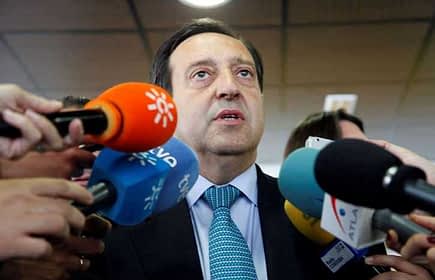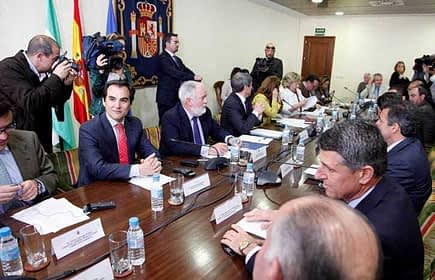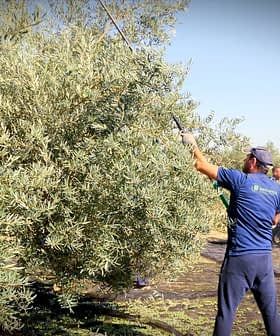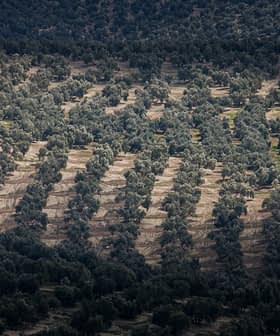
Interprofessional President Pedro Barato after meeting with European Commissioner for Agriculture Dacian Cioloş in Córdoba
Beefed up testing, better classification of olive oil and reaching out to non-EU producers are among a package of measures promised by European Commissioner for Agriculture Dacian Cioloş after meeting in Córdoba today with members of Spain’s olive oil sector including its Interprofesional del Aceite de Oliva Español (Interprofessional).
Interprofessional President Pedro Barato said those attending the meeting — including Spain’s Agriculture Minister, Miguel Arias Cañete, and his counterpart from the Andalusian regional government, Clara Aguilera — had stressed the sector’s social, environmental, economic and cultural importance for Spain.
The meeting came in the midst of the renegotiation of EC agricultural subsidies and the prolonged pricing crisis in the Spanish sector, which is in the final throes of a record harvest already exceeding 1.56 million tons.
Speaking to media after the meeting, Cioloş said an action plan for the sector would be finalised next month. He would then meet with the agriculture ministers of EU member countries to discuss its implementation.
Better standardization, more checks, crackdown on blends
Among his promised measures was the restructuring of the sector and improved “standardization of olive oil to promote quality.” Specifically, Cioloş spoke of “carrying out a series of physical and chemical tests to better detect illegal blends with olive oil; improved classification; and more quality control, because right now there are no mandatory checks.”
Also needed was “better adjustment of production to demand so as to enhance quality and standardization. ”
Cioloş also said he wanted to work with the International Olive Council (IOC) to jointly develop a series of measures to help producers and consumers beyond Europe, “because we want other producers to share the same standards so we can implement and apply them at all levels.”
He’d like the IOC to “open not only to olive oil producers, but to consumers in order to increase the sector’s potential and share common rules on its management.”
There would be increased means to promote olive oil and “enhanced market tracking and transparency in order to improve pricing.” And in regards to Spain’s fears its subsidies would be cut under current reform to the EU Common Agricultural Policy (CAP), Cioloş said the country would “undergo no loss” but gain flexibility in the use of its payments.
Spanish sector wants help to empower producers against super-stores
Cioloş also said he was open to debating initiatives put to him by the Interprofessional. “Our ideas converge on many points,” he said.
On its call to reduce fragmentation among producers — so they can drive a harder bargain with the handful of super-stores from which 60 percent of Spaniards buy their olive oil — he said he agreed steps were needed “so the sector can obtain a greater value added for its product.”
Among other measures sought by the Interprofessional are the maintenance of the current EC subsidy system for the sector, updated EC provisions for private storage payments, self-regulation (in Spain under the direction of the Interprofessional), tests to enforce product quality, a ban on blends of seed oils with olive oil, and a requirement that olive oil in restaurants be served in properly labeled bottles.
The Interprofessional is a non-profit official organization representing all members of Spain’s olive oil sector.









